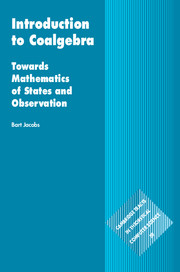2 - Coalgebras of Polynomial Functors
Published online by Cambridge University Press: 22 December 2016
Summary
The previous chapter has introduced several examples of coalgebras and has illustrated basic coalgebraic notions such as behaviour and invariance (for those examples). This chapter will go deeper into the study of the area of coalgebra, introducing some basic notions, definitions and terminology. It will first discuss several fundamental set theoretic constructions, such as products, coproducts, exponents and powersets in a suitably abstract (categorical) language. These constructs are used to define a collection of elementary functors, the so-called polynomial functors. As will be shown in Section 2.2, this class of functors is rich enough to capture many examples of interesting coalgebras, including deterministic and non-deterministic automata. One of the attractive features of polynomial functors is that almost all of them have a final coalgebra – except when the (non-finite) powerset occurs. The unique map into a final coalgebra will appear as behaviour morphism, mapping a state to its behaviour. The two last sections of this chapter, Sections 2.4 and 2.5, provide additional background information, namely on algebras (as duals of coalgebras) and on adjunctions. The latter form a fundamental categorical notion describing backand- forth translations that occur throughout mathematics.
Constructions on Sets
This section describes familiar constructions on sets, such as products, coproducts (disjoint unions), exponents and powersets. It does so in order to fix notation and to show that these operations are functorial, i.e. give rise to functors. This latter aspect is maybe not so familiar. Functoriality is essential for properly developing the theory of coalgebras; see Definition 1.4.5.
These basic constructions on sets are instances of more general constructions in categories. We shall give a perspective on these categorical formulations, but we do not overemphasise this point. Readers without much familiarity with the theory of categories may then still follow the development, and readers who are quite comfortable with categories will recognise this wider perspective anyway.
Products
We recall that for two arbitrary sets X, Y the product X × Y is the set of pairs
There are then obvious projection functions π1 : X×Y → X and π2 : X×Y → Y by π1(x, y) = x and π2(x, y) = y.
- Type
- Chapter
- Information
- Introduction to CoalgebraTowards Mathematics of States and Observation, pp. 33 - 113Publisher: Cambridge University PressPrint publication year: 2016



